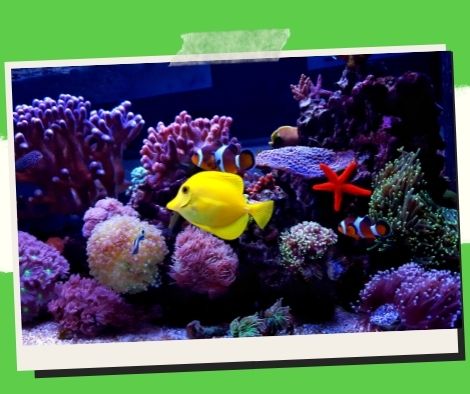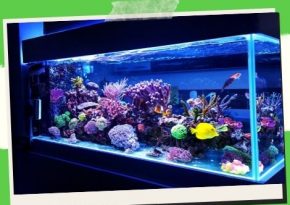
Aquarium algae prevention and saltwater aquariums
Algae is inevitable, as everyone who has owned an aquarium knows. It is merely one of the issues that saltwater and freshwater fish owners encounter on a regular basis.
Green algae, brown algae, red-brush algae, and blue-green algae are the four basic types of algae.
The type of algae that most people are familiar with is green algae. Any aquarium with lots of light will have a green algae bloom. Hair algae and hard “green dot algae” are the two types of green algae most frequently found in aquariums. Long, wispy strands of algae known as “hair algae” are easily removed from the tank. It is highly tough and time-consuming to remove green dot algae, which appears as green spots of algae on the side of the tank.
When a tank is first begun, brown algae are frequently visible. Within the first two weeks, it usually makes an appearance. Its presence in established tanks necessitates testing of the tank’s nitrate and phosphate levels by the aquarium owner. Because it grows in aquariums with little light, brown algae is remarkable in that respect. The owner of an aquarium must clean the entire tank and improve illumination when brown algae start to grow in it. When the tank’s circumstances normalize, it’s not unusual for brown algae to go.
A type of algae called red-brush algae prefers aquariums with high PH levels. Aquarium red-brush algae are extremely challenging to physically remove.
Because it is not an algae at all, blue-green algae are misleading. Actually, it is a cyanobacterium. When it first appears in the aquarium, it resembles a slime that has overtaken the space. Blue-green algae pose a threat to the health of the fish and can be harmful to aquarium plants.
You can prevent algae growth in your saltwater tanks in a variety of ways.
Reducing your illumination is one of the simplest ways to keep the number of algae in your saltwater tank under control. Algae’s ability to perform photosynthesis will be restricted if your aquarium lights are left on for fewer than nine hours each day. Use the least powerful setting you can.
Whenever you clean or replace the water in your saltwater aquarium, use distilled water. The period of time that algae can grow in your tank will be lowered by changing the water every two to three weeks. Make sure to vacuum your rocks when you change the water. Additionally, use as few additives as possible. Every week, replace the prefilter pad.
Fill your aquarium with fish that consume algae. These include hard starfish, yellow tang fish, blennies, turbo snails, angel fish, and small hermit crabs in saltwater aquariums.
Invest in the biggest, sturdiest algae glass cleaning magnet you can locate. The glass on your tank should remain free of algae if you use the magnet every time you clean the water in it. After each use, make careful to clean the magnet. You will need to use a razor blade to remove very difficult algae stains. Clean the overflow pipes as well.
Save/Share this story with QR CODE
Disclaimer
This article is for informational purposes only and does not constitute endorsement of any specific technologies or methodologies and financial advice or endorsement of any specific products or services.
📩 Need to get in touch?
📩 Feel free to Contact NextGenDay.com for comments, suggestions, reviews, or anything else.
We appreciate your reading. 😊Simple Ways To Say Thanks & Support Us:
1.) ❤️GIVE A TIP. Send a small donation thru Paypal😊❤️
Your DONATION will be used to fund and maintain NEXTGENDAY.com
Subscribers in the Philippines can make donations to mobile number 0917 906 3081, thru GCash.
3.) 🛒 BUY or SIGN UP to our AFFILIATE PARTNERS.
4.) 👍 Give this news article a THUMBS UP, and Leave a Comment (at Least Five Words).
AFFILIATE PARTNERS

World Class Nutritional Supplements - Buy Highest Quality Products, Purest Most Healthy Ingredients, Direct to your Door! Up to 90% OFF.
Join LiveGood Today - A company created to satisfy the world's most demanding leaders and entrepreneurs, with the best compensation plan today.



 Business Technology, Finance Technology & Information Technology
Business Technology, Finance Technology & Information Technology





